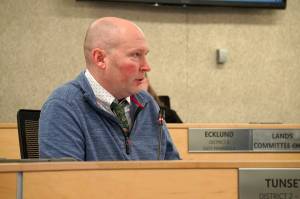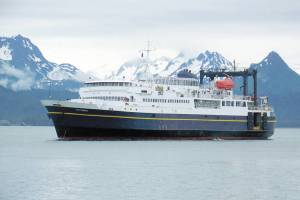LNG project ready to move forward after bill passes through Senate
Published 6:31 am Sunday, March 30, 2014
JUNEAU, Alaska — Oil and gas company executives said they’re prepared to move into the next phase of pursuing a major liquefied natural gas project under terms of a bill that recently passed the Alaska Senate.
The House Resources Committee is hearing SB138, which would set state participation in the project at about 25 percent and move the project — currently estimated to cost between $45 billion and more than $65 billion — into a phase of preliminary engineering and design and cost refinement.
David Van Tuyl, a regional manager for BP Alaska, told the committee Friday it’s important to take the time needed to get a mega-project right and not rush. But he said his company believes the project, as things stand today, can compete in the Asian markets and to the extent the gas resource can be monetized, he said it behooves everyone involved to move forward expeditiously.
The state has signed an agreement with the North Slope’s major players — BP, ConocoPhillips and ExxonMobil Corp. — TransCanada Corp. and the Alaska Gasline Development Corp., setting out broad terms for moving ahead. The state also signed a separate agreement with TransCanada to hold its interest in a pipeline and gas treatment plant, with the state having an option to buy back some of the equity. Both agreements are contingent upon passage of enabling legislation deemed acceptable by all the parties.
The process envisioned for pursuing the project would happen in stages, with opportunities for the state or another party to get out if they don’t want to continue. It’s not known whether a project in fact will be built but the executives said they were prepared to take the next step in examining the project’s viability. Company officials on Friday expressed support for the bill, as it stands.
The bill, however, is likely to change before the end of session, and questions continue about the role of TransCanada.
Officials with Gov. Sean Parnell’s administration say the proposed arrangement with TransCanada is a way for the state to not have to bear as much in upfront costs as it would without the pipeline company involved. They say the company brings with it valuable expertise.
Administration officials also say the arrangement serves as an amicable transition from terms of the Alaska Gasline Inducement Act, under which TransCanada for years pursued a project with ExxonMobil but which Parnell has said no longer fits with the current situation.
Legislative consultant Roger Marks told the committee Thursday that the plan appeared to be crafted at least partially to avoid potential fallout under the inducement act. He suggested the state take time to consider financing and other options, including whether it could pursue an agreement with the oil and gas companies to buy-in to the project once it’s sanctioned. He said it’s possible the state could spend hundreds of millions of dollars without a project ever materializing.
Bill McMahon Jr., involved with Alaska gas development for ExxonMobil Production, said while he couldn’t speak for the administration, being involved in the process early is important. It is in the next phase that parties will be looking at off-takes for in-state gas deliveries, he said.
Deputy Revenue Commissioner Mike Pawlowski, in an interview, said the administration looked at different types of financing. But he said issues like the size of pipe, off-takes and location of compressors for efficient expansion “are not bank terms. Those are (for) a pipeline company looking out for the future of their interest to move gas off the North Slope.”
“If you’re just going to go to a bank to borrow, you’re not going to get that expertise. That’s what I mean by, it’s not just a financial arrangement. It’s a power arrangement that gives the state the expertise” to move forward, he said.
Rep. Mike Hawker, R-Anchorage, sought clarity on certain terms in the TransCanada agreement, including a provision that would give TransCanada right of first refusal for five years if the state terminated the relationship. Tony Palmer, vice president of major projects development for TransCanada, said that obligation would not apply if the state exercised its right to termination before approval of a firm transportation services agreement. Such an agreement would be subject to legislative approval.
However, in that type of event, the state would still owe TransCanada for development costs plus 7.1 percent.
Hawker also asked if the project could continue to advance without the state and TransCanada being partners, as contemplated under the agreement.
Van Tuyl said, theoretically, it was possible but he believed the best way forward was laid out in the agreement that all the parties signed. Pat Flood, with Alaska gas development for ConocoPhillips Alaska, said state participation is a bedrock of the proposal, and how the state decides to move forward with its share was up to the state. He said depending on how that might work out, ConocoPhillips would do its best to continue moving forward.




